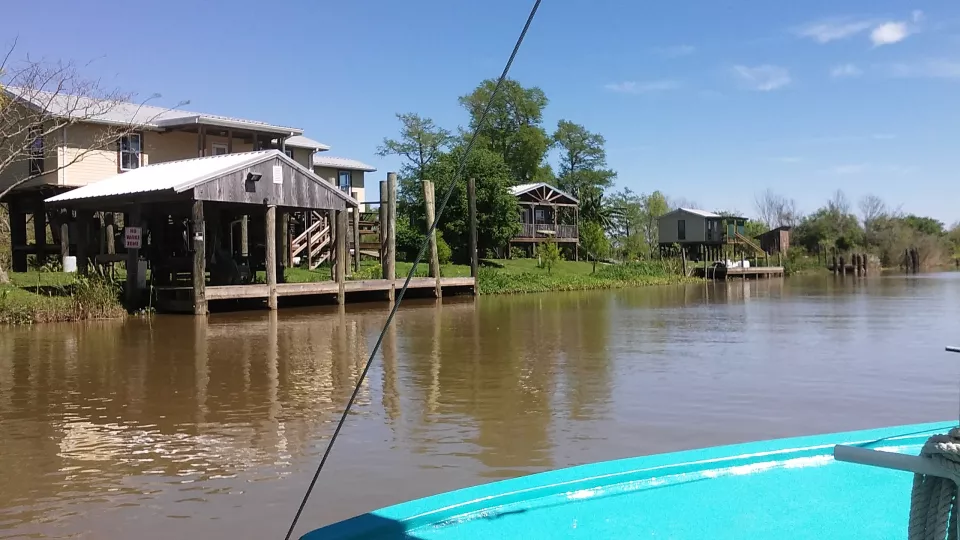Since Hurricane Katrina in 2005, which caused major loss of life and highlighted the vulnerability created by historical wetland loss, and the BP oil spill, in 2010, the state of Louisiana in the USA has received major funding to restore its fragile and valuable wetland delta. The wetland ecosystem is important for biodiversity, as an essential habitat and breeding ground for wildlife. The wetlands are also the motor in Louisiana’s lucrative fishing industry, and home to much of its valuable oil and gas and navigation industries, which provide significant income to the state and nation. In 2007, a new central agency was set up with the explicit aim to develop a coastal protection and restoration plan to protect human settlement and to maintain and rebuild the wetlands.
In this thesis, David O´Byrne examines the coastal protection and restoration plan, drawing on a range of economic and social theories and coastal geomorphology.
– Louisiana is an interesting case since the region is faced with both ecological and societal challenges. The wetlands are extremely important for biodiversity and they are also home to a unique small-scale fishery and numerous vibrant cultural groups. I wanted to assess strengths and weaknesses with the planning approach, to see how environmental aims and social needs align.
As part of the restoration process, the State is proposing to build large scale river diversions, cut into the Mississippi river’s levees, that will redirect the water and sediment and carry it to the disappearing wetlands. The diversions are meant to mimic the natural process, whereby the Mississippi river periodically flooded its banks, spilling sediment into the delta, maintaining it and building new land. These diversions are likely to push the optimal productive area for shrimp and oysters further out to sea, since they depend on a particular mix of fresh and salt water. This could have a detrimental effect on some small scale fishers, who would have trouble in accessing these new productive areas.
– If you want to build and maintain land in the area, which is sorely needed, using diversions might be a good alternative, though according to ecosystem models the range of possible outcomes for the proposed diversions is still very large. But they are also likely to have a disruptive effect on certain fisheries. Some fishers could lose their income, incur extra costs, be forced to relocate, and so on.
David O’Byrne explains that while the current plan is very scientifically progressive, and an improvement on previous efforts to restore the wetlands, it falls short on how the costs and benefits of the program, both monetary and non-monetary, are distributed. It lacks a clear strategy for how these communities could be sustained and helped to thrive.
– The main problem with the restoration plan, as I see it, is that it is underpinned by economic thinking that is too narrow, in that it prioritizes overall economic performance at the expense of localized and non-economic impacts. From this perspective it doesn’t matter that some communities might lose out, because the State’s modelling shows that the economic contribution to the state economy from the fishing sector as a whole will be sustained.
This narrow economic approach has been predominant in societal planning and development for decades. The idea being that efforts to stimulate the economy in general will cause benefits to trickle down to the rest of society, increasing the overall wealth in an area by creating new jobs, markets and financial opportunities. But as David O’Byrne’s analysis shows, based on field work, interviews, outreach and literature reviews, there are barriers to this wealth trickling down. Some fishermen have low levels of formal education, lack skills in English, have high levels of debt, or lack access to credit, which would make it hard to adapt to changed conditions. This means that though the fishing industry might survive the disturbance, there will be some who benefit and others who lose out. But beyond these economic losses, fishers may also lose other aspects of their lives they value, such as community connections and their particular way of life.
His work thus supports a growing body of research which argues that a solely economic perspective is not conducive to achieving real transformation, where excluded voices, needs and ways of using nature are included and integrated.
Growing social discontent
David O’Byrne’s thesis also highlights what can happen if local communities perceive that their needs are continuously overlooked. In Louisiana, a number of fishermen have joined together to protest against the planned diversions. The debate between the fishermen and the state agency, joined by influential environmental organisations, is polarized around the science of diversions. .
– It is natural that when people feel that the state is not living up to its responsibility that they will turn to protest. Indeed there have been many cases throughout history where this has been the only way that people have of getting their needs met.But the fact that the debate between the State and the fishermen has become all about the science of diversions, is not helping the fishermen.
Assist those who are challening the state to do a better job
As a conclusion to his research, David O’Byrne reflects on how scientist can help strengthen local demands.
– In the case of Louisiana, I argue that if the fishermen could redirect the debate away from the science of diversions and onto the impacts to their livelihoods, and the difficulty of adaptation, they might find more support from other environmental organizations and the public.
– In the end I don’t argue for or against diversions. Though the underlying principles are sound, the expected outcomes for the particular diversions currently proposed are still too uncertain. What I do argue is that coastal planning and restoration needs to take account of a wider set of criteria, which reflect the many ways in which people use and value nature, beyond just what it contributes to the state economy.
– While it is a challenge to include a multitude of demands and voices, that is what democracy is supposed to be about. Coastal restoration and planning has to be about the people who live and work in these areas. The reality is that achieving this will require putting pressure on the State. Just as researchers often produce work aimed at influencing state policy, we can equally put our effort into assisting those who are challenging the State to do a better job, he concludes.

